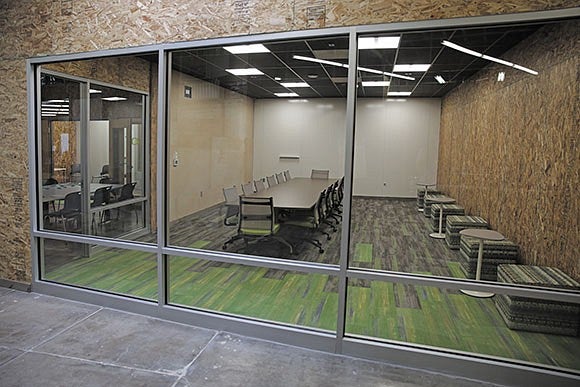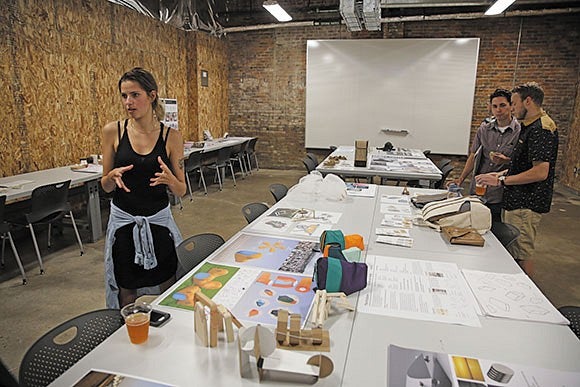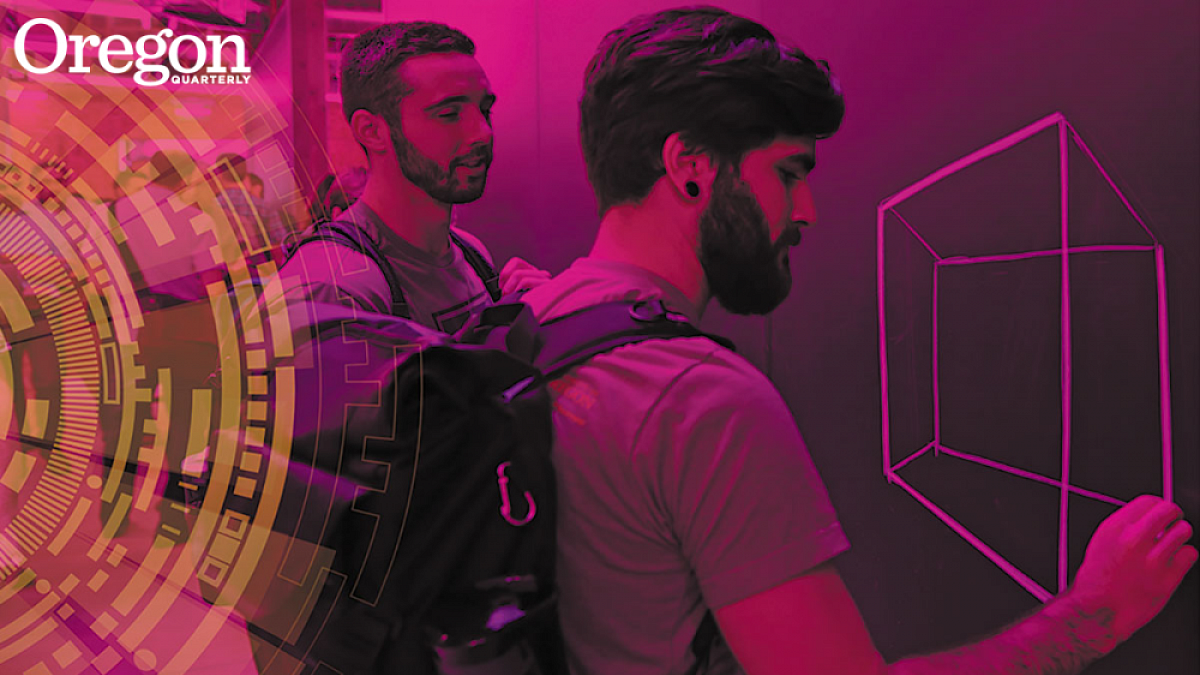Entrepreneurs looking to launch their next big idea—but without sacrificing their quality of life—find that the Eugene-Springfield area has lots to offer.
“You don’t have to go to Silicon Valley, you don’t have to go to Seattle or Portland. We have all the resources we need here and the alumni network to make our businesses successful,” says Chad Barczak, BS ’98, MBA ’99, CEO and cofounder of the Eugene-based firm IDX Broker.
The burgeoning innovation network that some have dubbed the “Silicon Shire” includes shared working spaces, business incubators, nonprofit organizations, and hundreds of young companies—ranging from specialized tech firms like Cognitopia to food and beverage purveyors such as Lola’s Fruit Shrubs. But aside from the preponderance of 20- and 30-somethings hanging out in downtown tea and bottle shops, the rise of regional innovation remains a largely hidden phenomenon to those outside the sector.
The University of Oregon has helped seed this phenomenon in many ways, and the institution’s influence is growing. Just look at the opening of the new downtown innovation space known as 942 Olive, the growth of student entrepreneurship programs on campus, and the increasing recruitment of UO graduates from the Department of Computer and Information Science and other programs.
Connections to the university can be found throughout the local business innovation network. Some are well-documented, such as the rise of architecture major Miguel McKelvey, BArch ’99, who founded the $16 billion company WeWork, or the story of business school grad Ryan Hoover, BS ’09, who founded the influential tech website Product Hunt.
But in the stories that follow, we’ll let you in on some of the—for now—lesser-known startups with UO ties.
PQ:
“When we say we’re from Eugene, Oregon, we hear two things: ‘Wow, the Oregon Ducks are awesome. That must be a great place to be,’ and ‘Oregon—I’ve always wanted to go there; I’ve heard it’s beautiful.’ ”
—Jake Weatherly
The Oregon Identity
Being associated with the University of Oregon has been a big plus for Eugene technology firm SheerID, says CEO and cofounder Jake Weatherly, a former geography and religious studies major at the UO who later taught an entrepreneurship class at the Charles H. Lundquist College of Business.
“The University of Oregon brand has been excellent for SheerID,” Weatherly says. “When we say we’re from Eugene, Oregon, we hear two things: ‘Wow, the Oregon Ducks are awesome. That must be a great place to be,’ and ‘Oregon—I’ve always wanted to go there; I’ve heard it’s beautiful.’”
It wasn’t always like this for the company, which provides eligibility verification for enterprises that advertise exclusive offers. Initially, SheerID deemphasized its Eugene roots, reasoning that being located in a small college town could be seen as a negative for a tech company competing with firms from the San Francisco Bay Area and New York City. But experience proved otherwise, and SheerID has found significant value in being an Oregon-based company with connections to the state’s flagship university.
“Being at the UO taught me that you can reach out to the world, make a difference, and innovate with an audience far beyond your own backyard,” Weatherly says. “I found that to be just amazing and eye-opening.”

That notion helped fuel the growth of his company, which now counts Spotify, DirecTV, Amazon, and Staples as clients. Since its inception in 2011, SheerID has undergone tremendous growth, completing a $5.3 million investment round led by Seattle’s Voyager Capital in September 2015, opening a Portland office, and doubling its employee count to more than 35 in 2016.
Weatherly and the company’s director of marketing and sales operations, Simon Spencer, first connected when Spencer was a student in Weatherly’s UO entrepreneurship class. SheerID’s general council, Jane Yates, JD ’04, is a graduate of the UO School of Law, and Tim Shear, the company’s vice president of sales, played inside linebacker for the UO football team under Coach Mike Bellotti and was a teammate of quarterback Joey Harrington.
Weatherly lists a half dozen other employees with UO credentials. He says the UO brand reflects many of the ideals of SheerID—authenticity, diligence, strong values, and innovation—and many clients can relate to those qualities as well.
“We should be loud and proud” of where we are located, Weatherly says. “There’s always a reason why somebody wants to come and visit us in Oregon instead of us going to visit them. Oregon is great for us.”
PQ:
“You don’t have to go to Silicon Valley, you don’t have to go to Seattle or Portland. We have all the resources we need here and the alumni network to make our businesses successful.”
—Chad Barczak, BS ’98, MBA ’99
Two Second Chances
The first time Chad Barczak attended the UO, he was admittedly not as focused on his studies as he should have been. So in 1992, during his sophomore year, he received a politely worded letter in the mail. “The University of Oregon asked me to no longer show up,” Barczak recalls. “I had flunked out.”
Barczak had a good excuse. During that year, he had cofounded Jaro, a snowboarding apparel company. His timing was fortuitous, and the 19-year-old sophomore soon found himself the CEO of a multimillion-dollar company.
Barczak rode the wave for several successful years, but ran into problems in the mid 1990s when the lack of a properly worded buy-sell agreement gave rise to a partnership dispute, which sent the company into a tailspin and led to its eventual demise. Many of the problems the company faced, Barczak says, could have been avoided by a more experienced CEO.
“I had the street smarts, but I didn’t have the book smarts,” he explains. “Had I stayed in school, the business might have been more successful.”
It didn’t take Barczak long to determine his next move. He wanted to return to the UO—not just to complete his bachelor’s degree, but also to pursue an MBA. He started by attending Lane Community College for two years, earning good grades and racking up credits. Then he successfully petitioned the UO to let him back in. “This time I wanted to be there,” Barczak recalls.
Getting into the MBA program proved to be more difficult. Barczak hounded the admissions office for advice on how to earn his acceptance. The director told him bluntly that because of his academic record, the odds were against him. “He was nice about it, but he told me that I probably wouldn’t get in,” Barczak recalls. “I was dead set on proving him wrong.”
In his application materials, Barczak emphasized his strong grades and his real-world experience steering a multimillion-dollar company. Ultimately, he was accepted into the accelerated MBA program, an advanced track that required students to complete the two-year program in four terms.
“It was good turnaround in my life and I credit the UO with giving me that goal,” Barczak says. “Once I set a goal, I usually don’t stop until I reach it.”
After graduating in 1999, Barczak set other goals for himself. He says the MBA program inspired him to get involved in the tech industry, and in 2004, he and his business partner, Jeff Kast, founded IDX Broker, a real estate tech firm that provides agents with private-label MLS (multiple-listing service) search engines for their websites. Barczak and Kast bootstrapped the startup with their own savings, building the business “one customer at a time.” Today, IDX Broker employs 54 people and is located in downtown Eugene in a newly renovated, 22,000-square-foot space.
“The UO gave me the confidence to go back out and ultimately be successful in a whole new industry,” Barczak says. “I learned to embrace the failures I had had, and learned that failure is not necessarily a bad thing. It became kind of a badge of honor to have such an ultimate failure with my clothing business, because it meant I had some good experience that hopefully I won’t replicate.”
PQ:
“Getting an actual formal education in business and specializing in entrepreneurship gave me the confidence to go out there and start a business and really put myself out there.”
—Kate Blazar, MBA ’16
By Women, for Women
When it comes to entrepreneurship, women are not nearly as well represented as they could be. Exact numbers for the local area are difficult to come by, but a recent story in the Register-Guard cited statistics that showed only two local tech firms—out of 418—are run by women.
Fortunately, there are reasons to believe the picture is improving. As more people recognize that a monoculture does not make for a healthy innovation ecosystem, more opportunities for women entrepreneurs are emerging.
Kate Blazar, MBA ’16, founder and CEO of Animosa, represents the new face of entrepreneurship. Her company, a startup that plans to make an ecofriendly kit—known as the Go with the Flow pack—for managing menstrual hygiene in the outdoors or while traveling, is led by four women. It is one of three women-led startups in the current cohort of the RAIN Eugene Accelerator. Housed in UO’s downtown innovation space at 942 Olive Street, the accelerator is a state- and UO-supported program that offers an intense boot camp experience for promising startup companies.
Blazar’s company received a $5,000 RAINMaker seed grant from the UO and won the $13,000 grand prize in a Bangkok business challenge for graduate students. Animosa also pitched at this year’s Willamette Angel Conference, which was informally dubbed the “Year of Women” because the majority of the companies were led by women.
Half of the current RAIN cohort consists of women, as compared to the first group two years ago, which contained 86 percent male-led startups. Blazar says having more women in the accelerator adds a new perspective and more diverse viewpoints, which is immensely valuable for companies targeting female consumers. “In the US, women’s purchasing power is growing rapidly and women make the majority of spending decisions, yet female consumers have long been underserved and stereotyped,” Blazar says. “Companies who really understand female consumers have an inherent market advantage.”

Blazar has other reasons to be optimistic. Her MBA New Venture curriculum gave rise to another woman-led company, Tougher, which makes rugged work wear for women in the trades, and which also won a RAINMaker grant.
The reasons for the gender gap in entrepreneurship are complex. Research shows that, generally speaking, women tend to be more risk-averse than their male counterparts, says Kate Harmon, undergraduate program manager in the UO’s Lundquist Center for Entrepreneurship. A shortage of role models and mentors compounds the problem, and makes women less likely to self-identify as entrepreneurs. Blazar says her academic experience at the UO helped her overcome some of these hurdles.
“Getting an actual formal education in business and specializing in entrepreneurship gave me the confidence to go out there and start a business and really put myself out there,” Blazar says. “When I meet with an investor now, I understand finances as well as they do, if not better.”
PQ:
“I took him up on his offer and brought him a dozen towels. He treated them and it wasamazing, the towels just didn’t smell. I found I could use them for multiple days.”
—Richard Geiger
Keeping the Funk Away
The antiodor fabric treatment known as deFUNKit owes a debt of gratitude to the University of Oregon—and not only because it was developed in the lab of UO chemistry professor Jim Hutchison and courtesy research associate John Miller.
The story of how the Eugene-made product came to market hinges both on CEO Richard Geiger, who arrived in Eugene with his family in 2012, and the area’s moist climate. The UO had just hired Geiger’s wife, Elizabeth Skowron, to serve as a professor in the Department of Counseling Psychology and Human Services. Geiger, the “trailing spouse,” set up shop with his own medical startup company in the UO Riverfront Research Park.
Housed alongside Dune Sciences, the parent company of deFUNKit, Geiger soon met Hutchison and Miller and made an offhand comment about the wet weather in the Northwest and its effect on dishtowels. He complained that nothing ever dried and that wet fabrics picked up strange smells in no time. Miller invited him to try out an antiodor clothing treatment that he and Hutchison had created. Rather than covering up odors with perfumes, it worked by breaking down odor-causing bacteria and bonding deodorizing molecules to fabrics to keep bacteria from returning. Miraculously, it created a shield that allowed fabrics to be used up to 20 times between washings. “I took him up on his offer and brought him a dozen towels,” Geiger recalls. “He treated them and it was amazing, the towels just didn’t smell. I found I could use them for multiple days.”
At the time, Hutchison and Miller were pursuing a separate line of innovation—a line of functionalized grids for electron microscopy. The treatment that had made Geiger’s towels stop smelling was sitting on a shelf collecting dust.
Geiger ended up liking Dune’s antiodor fabric treatment so much that he pitched his own involvement in the company to Hutchison and Miller and signed on as investor and CEO.
Geiger, Hutchison, and Miller shifted their attention from electron microscopy to the commercialization of their antiodor treatment. Dune Sciences won $305,000 in funding at the Willamette Angel Conference competition in 2014 and the company received funding from the Oregon Nanoscience and Microtechnologies Institute (ONAMI), the state’s economic development nonprofit organization. The firm was invited to join the 2014 RAIN Eugene Accelerator cohort.
Geiger says deFUNKit appeals to eco-conscious consumers looking to waste less water and pour fewer capfuls of detergent down the drain. And even those who don’t see a need to wear their clothes 20 times without washing them will appreciate the fact that the treatment will lengthen the lifespan of their clothing, he says.
Interest in deFUNKit spiked among workout fanatics recently when Outside magazine ran a story on the treatment. After treating all of her gear, the writer hung a wet towel on a hook, left a mound of sweaty workout clothes in her bathroom for a week, spent seven days skiing in the same outfit without washing it, and found barely a hint of body odor. “We smelled as good on day seven as we did on day one,” she concluded.
Since then, Geiger says, deFUNKit has been growing fast. Even though the product has been available only since March of this year, it is carried by more than 700 independent sporting goods stores.
“Go forward? Only thing to do! On we go!”
—Bilbo Baggins
Some people really like the Silicon Shire moniker. You can count Senator Ron Wyden and Eugene mayor Kitty Piercy among the supporters, and the media seems to have taken to it as well.
Others are less enthusiastic.
“Please don’t call it the Shire,” says Joe Maruschak, chief startup officer and director of the RAIN Eugene Accelerator. “The only ‘silicon’ is Silicon Valley and no one calls it that anymore. They call it the Peninsula, or Palo Alto, or Mountain View.
“When you stop trying to be something else and actually just be who you are, you do a lot better,” Maruschak adds. “We’re Eugene-Springfield.”
Cale Bruckner, BS ’96, disagrees. The primary architect of the Silicon Shire brand, Bruckner is president of the software design and development studio Concentric Sky. He helped coin the term and created the Silicon Shire online directory as a means of promoting the region and connecting people to the local startup community. In four years, the directory has grown from 60 companies to more than 200 firms with ties to the local innovation ecosystem. To keep things fun, Bruckner included local craft breweries in the mix of software firms, web developers, and digital marketing specialists.
“To be able to talk about something, it needs a name,” Bruckner says, explaining his initial motivation. “As far as brands go, it’s way better than #EUGTech. That doesn’t say anything at all; that’s not a brand.”
The Silicon Shire brand, Bruckner says, reflects the vibe of the community and is more than a simple attempt to redirect the glory of the Santa Clara Valley onto the Willamette Valley.
“We’re never going to be Silicon Valley or Silicon Alley,” Bruckner argues. “It’s our eccentricities that make us who we are. I think that we shouldn’t shy away from that, we should honor that by being a little weird.”
—By Lewis Taylor
Lewis Taylor is director of research communications in the Office for Research and Innovation.


